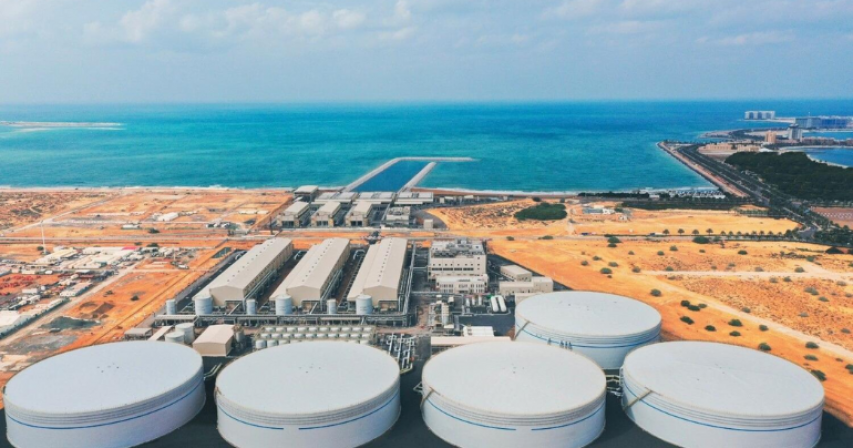How UAE’s new desalination plant provides safe drinking water to 2 million residents

The UAE has unveiled Naqa’a, one of the world’s largest desalination projects utilizing seawater reverse osmosis (SWRO) technology, to cater to the water needs of approximately 2 million residents in the country's northern regions. This mega project, developed in collaboration between Etihad Water and Electricity, Mubadala, and Saudi Arabia’s ACWA Power, boasts a production capacity of 150 million gallons per day.
Situated in Umm Al Quwain, the newly operational plant extends its distribution network to Ras Al Khaimah, Fujairah, Dibba Al Fujairah, Ajman, and Dhaid in Sharjah, ensuring a consistent and reliable supply of potable water across these areas.
Eng. Yousif Al Ali, CEO of Etihad Water and Electricity, emphasized the strategic importance of Naqa’a in meeting the growing demand for freshwater in a region with limited natural water resources. The UAE faces significant water stress due to a combination of rising demand from infrastructure expansion and population growth, in a desert environment. Desalination is therefore vital to ensuring access to safe drinking water. Al Ali highlighted that the plant supports the Mohamed bin Zayed Water Initiative, underlining the UAE's commitment to water security through actionable initiatives.
Naqa’a’s desalinated water meets stringent quality standards for human consumption. Al Ali confirmed that the plant employs rigorous procedures to ensure compliance with national and World Health Organization (WHO) drinking water standards. These measures include periodic sterilization of lines and tanks, along with regular and random quality testing to guarantee the safety and reliability of the water supplied to residents.
The plant uses SWRO technology, which is considered environmentally friendly due to its significantly lower energy consumption compared to traditional thermal desalination methods. Innovations such as variable frequency drives (VFD) and pressure exchangers (PX) have reduced the plant’s energy usage by up to 60 percent, allowing high-quality freshwater production with minimal environmental impact.
Addressing the environmental considerations of constructing and operating the plant, Etihad Water and Electricity implemented initiatives to protect local flora and fauna, such as relocating indigenous species and Ghaf trees before construction began, and organizing beach cleanup projects involving plant staff.
Looking ahead, Etihad Water and Electricity plans to explore technological upgrades and potential expansions to enhance the plant’s capacity and distribution efficiency. This proactive approach aims to manage current demands effectively while preparing for future needs, thereby contributing to the national water security strategy.
In summary, Naqa’a not only provides a sustainable and reliable source of safe drinking water for millions but also aligns with the UAE’s broader goals of environmental stewardship and long-term water security.
By: Sahiba Suri





Comments